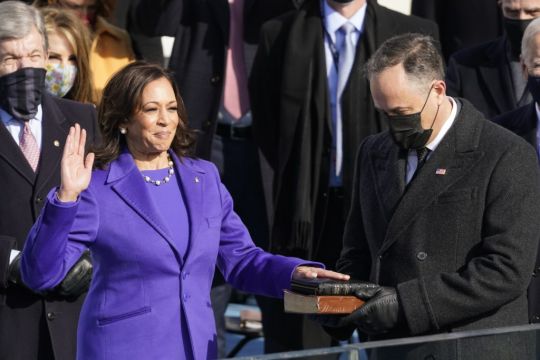US vice president Kamala Harris has broken the barrier that has kept men at the top ranks of American power for more than two centuries.
Ms Harris was sworn in as the first female vice president – and the first black woman and person of South Asian descent to hold the position – in front of the US Capitol by Supreme Court justice Sonia Sotomayor.
She was escorted to the podium by Capitol Police Officer Eugene Goodman, the officer who single-handedly took on a mob of Donald Trump supporters as they tried to breach the Senate floor during the Capitol insurrection that sought to overturn the election results.
Ms Harris was wearing clothes from two young, emerging black designers – a deep purple dress and coat. After taking the oath of office, a beaming Ms Harris hugged her husband, Douglas Emhoff, and gave President Joe Biden a fist bump.
Her rise is historic in any context, another moment when a stubborn boundary falls away, expanding the idea of what is possible in American politics.
But it is particularly meaningful because Ms Harris is taking office at a moment of deep consequence, with Americans grappling over the role of institutional racism and confronting a pandemic that has disproportionately devastated black and brown communities.

Those close to Ms Harris say she will bring an important – and often missing – perspective in the debates on how to overcome the many hurdles facing the new administration.
Lateefah Simon, a civil rights advocate and long-time friend and mentee of Ms Harris, said: “In many folks’ lifetimes, we experienced a segregated United States.
You will now have a black woman who will walk into the White House not as a guest but as a second in command of the free world.”
Harris, 56, moves into the vice presidency just four years after she first came to Washington as a senator from California, where she had served as attorney general and as San Francisco’s district attorney.
For the people—always. pic.twitter.com/KW0TS1cnUq
— Kamala Harris (@KamalaHarris) January 20, 2021
Advertisement
She had expected to work with a White House run by Hillary Clinton, but Mr Trump’s victory quickly scrambled the nation’s capital and set the stage for the rise of a new class of Democratic stars.
After Ms Harris’ own presidential bid fizzled out, her rise continued when Mr Biden chose her as his running mate last August. Ms Harris had been a close friend of Beau Biden, the eldest son of Mr Biden and a former Delaware attorney general who died in 2015 of cancer.
Mr Biden, in his inaugural address, reflected on the 1913 march for women’s suffrage the day before former president Woodrow Wilson’s inauguration, during which some marchers were heckled and attacked.
Mr Biden said: “Today, we mark the swearing in of the first woman in American history elected to national office, vice president Kamala Harris. Don’t tell me things can’t change.”







